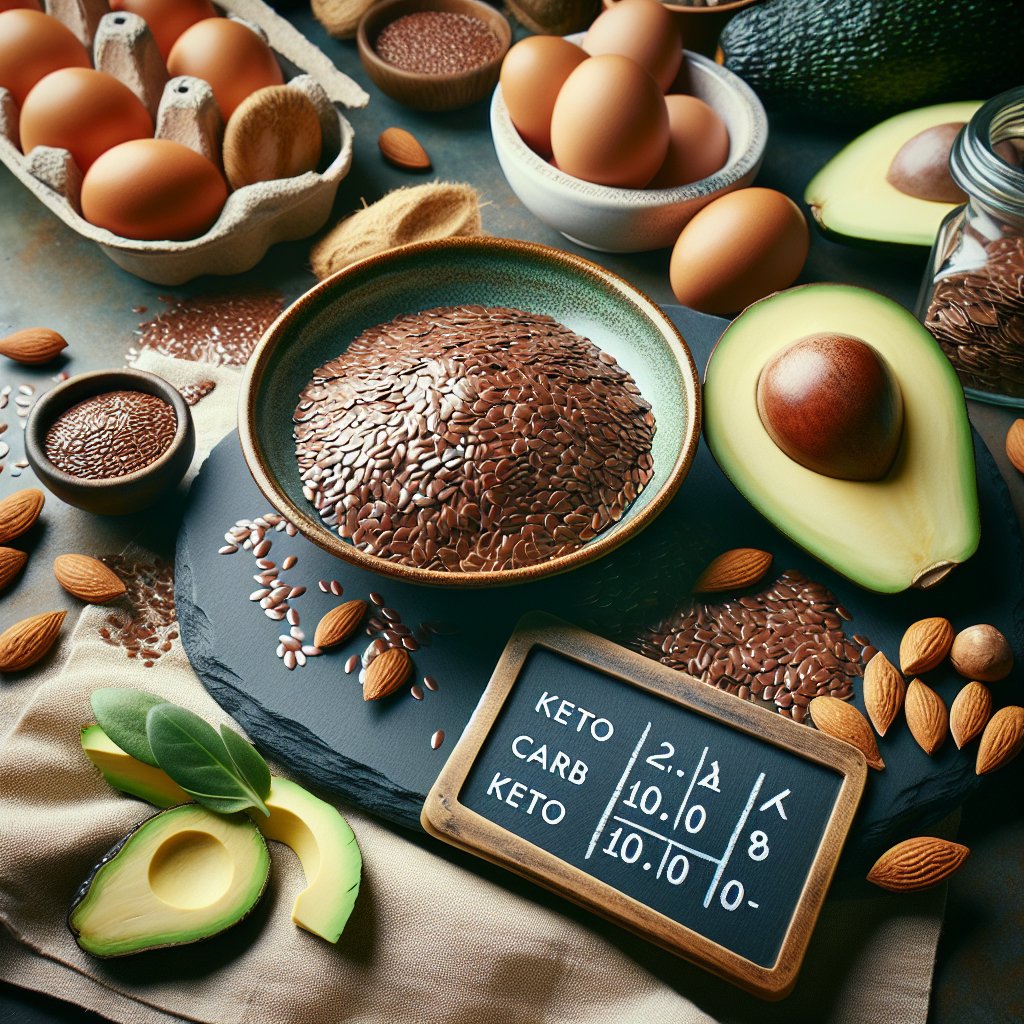Is Flax Seed Keto-Friendly? Exploring the Popularity and Benefits of Flax Seeds in Ketogenic Diet
Exploring the Popularity and Benefits of Flax Seeds in Ketogenic Diet
Have you heard about the ketogenic diet? It’s been making waves in the health and wellness community for its remarkable ability to promote weight loss, increase energy levels, and improve overall well-being. As a result, more and more people are exploring the ins and outs of this low-carb, high-fat diet. The ketogenic diet, or keto diet for short, primarily focuses on consuming high amounts of healthy fats, adequate protein, and minimal carbohydrates. This unique approach puts the body in a state of ketosis, where it becomes incredibly efficient at burning fat for energy.
With the increasing interest in the ketogenic lifestyle, there’s also a growing demand for keto-friendly foods. That’s where nutrient-dense superfoods like flax seeds come into the picture. Flax seeds have gained significant popularity among individuals following the ketogenic diet due to their impressive nutritional profile and versatility in various recipes. These tiny seeds are packed with essential nutrients, including omega-3 fatty acids, fiber, and protein, making them a valuable addition to a keto-friendly pantry.

What is the Ketogenic Diet?
The ketogenic diet, often referred to as the keto diet, is a low-carb, high-fat eating plan that has gained immense popularity in recent years. The primary focus of the ketogenic diet is to induce a metabolic state called ketosis. This is achieved by drastically reducing carbohydrate intake and replacing it with healthy fats. When the body is in ketosis, it becomes incredibly efficient at burning fat for energy instead of glucose from carbohydrates.
Research has shown that the ketogenic diet can lead to significant weight loss and have positive effects on various health markers, such as cholesterol levels and blood sugar control. Furthermore, it has been used as an effective dietary intervention for conditions like epilepsy and polycystic ovary syndrome (PCOS).
If you’re wondering if flax seeds fit into the keto diet, the good news is that they are an excellent addition to this eating plan. Let’s delve into the specifics of why flax seeds are indeed keto-friendly.
Nutritional Profile of Flax Seeds
When it comes to the ketogenic diet, understanding the macronutrient content of the foods we consume is crucial. Flax seeds, in particular, are a powerhouse of essential nutrients, making them an excellent addition to a keto-friendly lifestyle.
Carbohydrates
One of the key considerations for a keto diet is the carbohydrate content of the foods we eat. Flax seeds are extremely low in carbs, with just 1.6 grams of net carbs per 2-tablespoon serving. This makes them an ideal choice for those following a ketogenic eating plan, as they are unlikely to disrupt ketosis.
Fats
Flax seeds are rich in healthy fats, including omega-3 fatty acids. These fats are not only beneficial for heart health but also play a significant role in maintaining ketosis. With 12 grams of fat per 2-tablespoon serving, flax seeds provide a valuable source of healthy fats to support your keto journey.
Fiber
In addition to being low in net carbs and high in healthy fats, flax seeds are also an excellent source of dietary fiber. Just 2 tablespoons of flax seeds contain 3.8 grams of dietary fiber. Fiber is essential for digestive health and can also help to keep you feeling full and satisfied, which is particularly beneficial when following a ketogenic diet.
So, when it comes to the macronutrient content, flax seeds certainly check all the boxes for a keto-friendly food. With their low net carb content, richness in healthy fats, and a good dose of fiber, they can be a valuable addition to your ketogenic meal plan.
Now that we’ve covered the macronutrient profile of flax seeds, let’s delve into the numerous benefits these tiny seeds offer for those following a ketogenic lifestyle.
Carbohydrate Content in Flax Seeds
One of the key factors to consider when following a ketogenic diet is the net carb count of foods. In the case of flax seeds, the carbohydrate content is mainly in the form of dietary fiber, making them a popular choice for those following a keto lifestyle.
When exploring if flax seeds are keto-friendly, it’s important to understand the concept of net carbs. The total carbohydrates in a food item minus the fiber content gives the net carbs, which is the value that impacts blood sugar. In a 1-ounce (28 grams) serving of flax seeds, there are approximately 8 grams of total carbohydrates. However, out of these 8 grams, a whopping 7.6 grams are fiber. This leaves only 0.4 grams of net carbs in a serving of flax seeds, making them an extremely low-carb and keto-friendly option.
According to the USDA National Nutrient Database, flax seeds contain a high proportion of fiber, which not only aids in digestion and promotes a feeling of fullness but also has minimal impact on blood sugar levels. This makes flax seeds an excellent choice for individuals on a ketogenic diet.
Flax Seeds and Ketosis
Due to their incredibly low net carb count, flax seeds can be consumed without significantly impacting ketosis. Ketosis is the metabolic state in which the body relies primarily on fats for fuel instead of carbohydrates. Consuming foods with high fiber and low net carbs, such as flax seeds, can support the body in maintaining ketosis.
Furthermore, the high fiber content in flax seeds can assist in mitigating any potential digestion issues that some individuals may experience when transitioning to a keto diet.
When it comes to incorporating flax seeds into a ketogenic diet, their minimal net carb count makes them a valuable addition to various recipes, including keto-friendly bread, smoothies, and baked goods. With its versatility and nutritional benefits, flax seeds unquestionably fit well within the framework of a keto lifestyle.

The Importance of Fiber in a Keto Diet
When it comes to the ketogenic diet, fiber often takes a backseat to protein and fat. However, it’s important to understand that fiber plays a crucial role in our overall health, especially on a keto diet. Many people struggle with meeting their daily fiber requirements while following a low-carb eating plan. This is where flax seeds come to the rescue!
Fiber in Flax Seeds
Flax seeds are a fantastic source of dietary fiber, which is essential for maintaining a healthy digestive system and promoting a feeling of fullness. A 1-tablespoon serving of flax seeds contains about 2 grams of fiber, making it a valuable addition to a keto diet. Fiber not only aids in digestion but also helps stabilize blood sugar levels, which is crucial for those following a low-carb lifestyle.
Moreover, the fiber content in flax seeds can contribute to improved gut health by acting as a prebiotic, supporting the growth of beneficial bacteria in the gut. This can have a positive impact on overall well-being and may even help alleviate certain digestive issues that some individuals experience when transitioning to a keto diet.
Research has shown that a diet rich in fiber is associated with a reduced risk of developing various chronic diseases, including heart disease, diabetes, and certain types of cancer. Therefore, incorporating fiber-rich foods like flax seeds into a ketogenic eating plan is highly beneficial for long-term health.
Now that we’ve covered the importance of fiber and how flax seeds contribute to it, let’s delve deeper into the keto-friendliness of flax seeds and their impact on the body’s state of ketosis.
Healthy Fats in Flax Seeds
Flax seeds are a powerhouse of nutrition, especially when it comes to healthy fats. These tiny seeds are loaded with omega-3 fatty acids, a type of polyunsaturated fat that is essential for overall health. Omega-3 fatty acids play a crucial role in reducing inflammation, improving heart health, and supporting brain function.
In fact, a study published in the Nutrition Journal highlighted the significant presence of alpha-linolenic acid (ALA), a type of omega-3 fatty acid, in flax seeds. ALA has been associated with a reduced risk of cardiovascular disease and improved lipid profiles, making it a valuable addition to a heart-healthy diet – such as the ketogenic diet.
On a keto diet, it’s important to prioritize foods that are rich in healthy fats to maintain ketosis. Flax seeds can be an excellent choice in this regard. The high omega-3 content in flax seeds not only supports the body’s fat requirements but also contributes to a feeling of fullness, making it easier to stick to your keto meal plan without feeling deprived.
So, to answer the burning question, “Is flax seed keto-friendly?” – Absolutely! With its exceptional omega-3 content, flax seeds are a fantastic, keto-friendly way to boost your healthy fat intake and reap the benefits of a high-fat, low-carb lifestyle.
Potential Benefits of Flax Seeds on Keto
Flax seeds are a powerhouse of nutrients that can offer several benefits when incorporated into a ketogenic diet. Let’s dive into how flax seeds can support weight loss, digestion, and overall health on a keto diet.
Supporting Weight Loss
Research has shown that flax seeds may aid in weight management on a keto diet. The high fiber content of flax seeds can promote a feeling of fullness, reducing overeating and snacking, which are common hurdles in weight loss journeys. Additionally, the omega-3 fatty acids in flax seeds have been linked to potential improvements in body composition and fat loss.
Improving Digestion
For those on a keto diet, digestion can sometimes be a challenge. Flax seeds are rich in soluble and insoluble fiber, which can support healthy digestion by preventing constipation and promoting regular bowel movements. The fiber content also acts as a prebiotic, supporting the growth of beneficial gut bacteria, thereby contributing to overall gut health.
Promoting Overall Health
Flax seeds are known for their anti-inflammatory and antioxidant properties, which can be especially beneficial on a keto diet. The lignans and polyphenols in flax seeds have been associated with reduced inflammation and oxidative stress, potentially lowering the risk of chronic diseases and supporting overall well-being.
With these impressive benefits, it’s clear that flax seeds are indeed keto-friendly and can play a valuable role in promoting health and wellness on a ketogenic diet.

How to Incorporate Flax Seeds into a Keto Diet
Flax seeds are an excellent addition to a ketogenic diet, offering a myriad of health benefits. They are keto-friendly, providing a rich source of healthy fats, fiber, and essential nutrients. Here are some practical tips and delicious recipes for adding flax seeds to your keto meals:
Flax Seed Meal
Ground flax seeds, also known as flaxseed meal, are incredibly versatile and can be incorporated into various keto-friendly recipes. You can add flaxseed meal to low-carb smoothies, yogurt, or unsweetened almond milk for a nutrient boost. It can also be used as a low-carb thickening agent in soups and stews.
Flax Seed Crackers
Flax seed crackers are crunchy, flavorful, and perfect for snacking on a keto diet. You can make your own flax seed crackers by combining ground flax seeds with water, herbs, and spices, spreading the mixture thinly on a baking sheet, and baking until crispy. Enjoy them with your favorite keto-friendly dips or cheeses.
Flaxseed Oil Dressings
Drizzling flaxseed oil over a fresh salad is a great way to elevate the nutritional content of your meal. Mix flaxseed oil with vinegar, lemon juice, and your choice of keto-friendly herbs and spices to create a delicious and healthy dressing. This simple addition can significantly enhance the flavor and texture of your salads.
By incorporating flax seeds into your ketogenic meals, you can enjoy their numerous health benefits while staying in ketosis. These practical tips and recipes will help you seamlessly integrate flax seeds into your keto lifestyle, making your meals not only nutritious but also delicious.
Precautions and Considerations
While flax seeds are a fantastic addition to a keto diet, there are some precautions and considerations to keep in mind to ensure you’re reaping all the benefits without any drawbacks.
Potential Drawbacks
One potential drawback of consuming flax seeds on a keto diet is their high fiber content. While fiber is typically beneficial, consuming too much can lead to digestive issues such as bloating, gas, and stomach discomfort. It’s essential to start with small amounts of flax seeds, gradually increasing intake as your body adjusts.
Interactions with Medications
It’s important to note that flax seeds may interact with certain medications, including blood thinners, cholesterol-lowering medications, and diabetes drugs. If you’re taking any prescription medications, it’s best to consult with your healthcare provider before incorporating flax seeds into your daily diet.
Additionally, some individuals may have allergies to flax seeds, so if you have a history of seed allergies, it’s crucial to exercise caution and consider alternative sources of healthy fats and fiber.
By being mindful of these potential drawbacks and interactions, you can enjoy the many benefits of flax seeds while maintaining a well-rounded and keto-friendly diet.
These precautions and considerations will ensure that you can enjoy the nutritional benefits of flax seeds while being mindful of any potential drawbacks or interactions, making it a keto-friendly choice for your overall well-being.
Conclusion
After exploring the keto-friendliness of flax seeds and their potential role in a well-rounded ketogenic diet, it’s clear that flax seeds are indeed a valuable addition to a keto lifestyle. Their high fiber content, low net carb count, and richness in healthy fats make them a great choice for those following a ketogenic diet.
Research has shown that incorporating flax seeds into a ketogenic diet can have numerous health benefits. The omega-3 fatty acids present in flax seeds have been linked to reduced inflammation and improved heart health. Additionally, the high fiber content of flax seeds can aid in digestion and contribute to a feeling of fullness, which can be beneficial for those looking to manage their weight on a keto diet.
It’s important to note that while flax seeds are keto-friendly, they should be consumed in moderation, as the high fiber content may cause digestive discomfort in some individuals if consumed in large amounts. Including a variety of keto-friendly foods in your diet is key to ensuring balanced nutrition and overall well-being.
Enjoying Flax Seeds on a Keto Diet
There are numerous delicious ways to incorporate flax seeds into your ketogenic lifestyle. From adding ground flax seeds to your morning smoothie or yogurt to using flaxseed meal as a flour substitute in keto-friendly baking recipes, the versatility of flax seeds makes it easy to enjoy their benefits in a variety of dishes.
Remember to store flax seeds in an airtight container in a cool, dark place to maintain their freshness and nutritional value. Consider grinding whole flax seeds as needed to prevent them from going rancid, as the oils in flax seeds can become unstable once exposed to air.
Ultimately, flax seeds can be a valuable component of a well-rounded ketogenic diet, offering a range of health benefits and culinary possibilities. By incorporating this nutrient-dense seed into your meals and snacks, you can enhance the nutritional profile of your keto diet while enjoying its unique texture and nutty flavor.


